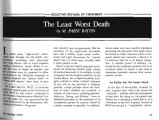Filters: Collection: "ir_uspace" Subject: "Death"
1 - 25 of 5
| Creator | Title | Description | Subject | Date | ||
|---|---|---|---|---|---|---|
| 1 |
 |
Battin, Margaret P. | Least worst death: selective refusal of treatment | In recent years "right-to-die" movements have brought into the public consciousness something most physicians have long known: that in some hopeless medical conditions, heroic efforts to extend life may no longer be humane, and the physician must be prepared to allow the patient to die. Physician re... | Death; Dying; Right to die; Natural death | 1983 |
| 2 |
 |
McDaniel, Susan | Social bases of neonatal and postneonatal mortality: an ecological analysis of Alberta, Canada | Canada's steady downward trend in mortality in the twentieth century has not been matched by a similar decline in infant mortality. This paper examines, by reference to census divisions in Alberta, the degree to which neonatal and postneonatal mortality are related to environmental factors. Although... | Death; Exogeneous; Rates | 1981 |
| 3 |
 |
Smith, Ken R.; Bean, Lee Lawrence; Mineau, Geraldine Page; Fraser, Alison M.; Lane, Diana | Infant deaths in Utah, 1850-1939 | Of all the health revolutions that have taken place in the United States since 1850, the reduction of infant mortality is arguably the most dramatic and far-reaching. Because of the incompleteness and unreliability of surviving vital records,, we will probably never know precisely the rate of infan... | Death; Utah; Infant mortality | 2002 |
| 4 |
 |
Smith, Ken R.; Mineau, Geraldine Page; Kerber, Richard A. | Effects of childhood and middle-adulthood family conditions on later-life mortality: evidence from the Utah population database, 1850-2002 | How do parents affect the health and longevity of their children? Parents can affect their children's life chances by transmitting a genetic endowment (or liability) for a long life while also providing resources and an environment that enhances (or limits) their children's longevity. Recently, m... | Growth; Death; Adolescence; Geriatrics | 2005-01-05 |
| 5 |
 |
Battin, Margaret P. | Age-rationing and the just distribution of health care: Is there a duty to die? | The author analyzes the argument that a policy involving distributive justice in the allocation of scarce health care resources, based on the strategy of rational self interest maximation under a veil of ignorance (Rawls/Daniels), would result in an age rationing system of voluntary, socially encour... | Health care providers; Death; Euthanasia | 1987-01 |
1 - 25 of 5
